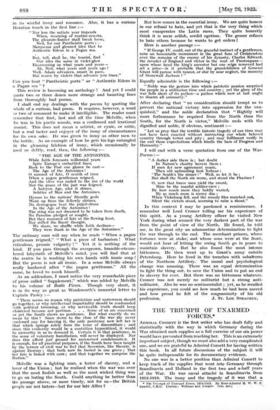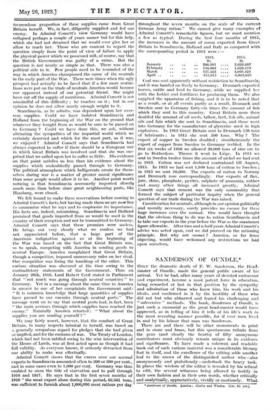THE TRIUMPH OF UNARMED FORCES.*
ADMIRAL CoNsETT is the first writer who has dealt fully and statistically with the way in which Germany during the War obtained such supplies as a full exercise of our sea' 'power would have prevented from reaching her. This is an extremely important subject;though we must also add a very complicated one, and we are grateful to Admiral Consett for having written this book. In all future discussions of the subject it will be quite indispensable for its documentary evidence.
No one was in a better position than Admiral Consett to keep track of the supplies that went into Germany through Scandinavia and Holland in the first two and a-half years of the War. He was naval attaché in Scandinavia from 1912-1919. The irony and the tragedy of it was that a
• The Triumph of Unarms-1 Forces, 1914-1918. By Rear-Admiral M. W. W. 1', Cornett, C.M.U. London: William and Norgate. 1154. net.J
tremendous proportion of these supplies came from Great Britain herself. We, in fact, diligently supplied and fed our enemy. In Admiral Consett's view Germany would have collapsed perhaps a couple of years sooner but for this help, which she had not dreamed that we would ever give her or allow to reach her. Those who are content to regard the question simply from the point of view of failure to apply the physical power which we possessed will, of course, say that the British Government was guilty of a crime. But the question is not nearly so simple as that. There was also a political side to it. Few people need to be reminded of the way in which America championed the cause of the neutrals in the early part of the War. There were times when the ugly prospect had actually to be faced that if a few more restric- tions were put on the trade of neutrals America would become our opponent instead of our potential friend. She might have cut off the supply of munitions. Admiral Consett is not unmindful of this difficulty ; he touches on it ; but in our opinion he does not allow nearly enough weight to it.
Scandinavia, as he admits, was dependent upon her over- seas supplies. Could we have isolated Scandinavia and Holland from the beginning of the War on the ground that whatever they bought from us would be sure to be passed on to Germany ? Could we have done this, we ask, without alienating the sympathies of the impartial world which we certainly deserved and which for the most part, as it was, we enjoyed ? Admiral Consett says that Scandinavia had always expected to suffer if there should be a European war in which Great Britain was involved and that she was sur- prised that we called upon her to suffer so little. His evidence on that point satisfies us less than his evidence about the supplies which undoubtedly passed through to Germany. The political atmosphere which belligerents create for them- selves during war is a matter of greater moral significance than some people would allow it to be. Another point worth noticing is that Scandinavia necessarily imported directly much more than before since great neighbouring ports, like Hamburg, were closed.
We felt bound to make these reservations before coming to Admiral Consett's facts, but having made them we are now free to summarize what he says and to emphasize its importance. His facts are, indeed, astonishing. Scandinavia and Holland promised that goods- imported from us would be used in the country of their reception and not be transmitted to Germany. Admiral Consett says that these promises were useless. He brings out very clearly what we confess we had not appreciated before, that a large part of the American indignation against us at the beginning of the War was based on the fact that Great Britain was, so to speak, competing with America in sending goods to neutral Europe. America complained that Great Britain, though a competitor, imposed unnecessary rules on her rival. One competitor was fixing the handicap of the other. This curious situation was obscured at the time owing to the contradictory statements of the Government. Thus on January 26th, 1916, Lord Robert Cecil stated in Parliament that " not much was going through neutral countries " to Germany. Yet in a message about the same time to America in answer to one of her complaints the Government said : " It is common knowledge that large quantities of supplies have passed to our enemies through neutral ports." The message went on to say that neutral ports had, in fact, been " the main avenues through which supplies have reached the enemy." Naturally America retorted : " What about the supplies you are sending yourself ? "
We may fairly assert, however, that the conduct of Great Britain, in many respects inimical to herself, was based on a generally scrupulous regard for pledges that she had given or implied, and for the customs of war. The Treaty of London, which had not been. ratified owing to the wise intervention of the House of Lords, was at first acted upon as though it had full validity. As everyone knows, it seriously detracted from our ability to make war effectually.
Admiral Consett shows that the excess over our normal exports to Scandinavia amounted often to 200 or 300 per cent., and in some cases even to 1,000 per cent. Germany was thus enabled to stem the tide of starvation and to pull through 1916 and 1917. He says that in the first seven months of
1916 " the meat export alone during this period,62,561 tons, was sufficient to furnish about 1;000,000 meat rations per day
throughout the seven months on the scale of the current German Army ration." We cannot give many examples of Admiral Consett's remarkable figures, but yr! must mention a few as typical. During the first four months of 1915, the increases in the amount of cocoa exported from Great Britain to Scandinavia, Holland and Italy as compared with the corresponding period in 1913 were :—
1913. lb. 1915. lb.
January
••
••
ea
260,361
2,026,087 February
•• ••
116,868
1,628,173 March
•• ••
137,423 .... 4,000,428 April ..
• •
415,815 .. • . 8,903,633
Coal was sent apparently without restriction to Scandinavia, and it was handed on freely to Germany. Denmark exported horses, cattle and food to Germany, while we supplied her with the fodder and fertilizers for producing them. We also supplied the apparatus of fishing, and it is to be noted that as a result, or at all events partly as a result, Denmark and Sweden sent to Germany forty-six times the amount of fish which they sent to this country. Great Britain more than doubled the amount of oil seeds, tallow, lard, fish oils, animal oils and fats which she sent to Scandinavia, and these went into Germany for the manufacture of glycerine used in high explosives. In 1913 Great Britain sent to Denmark 150 tons of lubricants ; in 1915 she sent 500 tons. Why ? The export of copper to Sweden doubled ; simultaneously the export of copper from Sweden to Germany trebled. In the first six weeks of 1916 we allowed 20,000 tons of zinc ore to go to Rotterdam. Thence it went to Liege. In 1915 we sent to Sweden twelve times the amount of nickel we had sent in 1913. Cotton was not declared contraband till August, 1915. In 1913 we had sent 1,940 tons of cotton to Sweden ; in 1915 we sent 10,300. The exports of cotton to Norway and Denmark rose correspondingly. Our exports of flax, jute, skins, phosphate, pyrites, sulphate of ammonia, rubber and many other things all increased greatly. Admiral Consett says that cement was the only commodity that formed the subject of particular inquiry when the general question of our trade during the War was raised.
Consideration for neutrals, although in our opinion politically and morally necessary, surely provides no excuse for these huge increases over the normal. One would have thought that the obvious thing to do was to ration Scandinavia and to take our exports in the year before the War as the maximum figure allowable. After two and a-half years Admiral Consett's advice was acted upon, and we did proceed on the rationing principle. But why not sooner ? America, so far from objecting, would have welcomed any restrictions we laid upon ourselves.











































 Previous page
Previous page